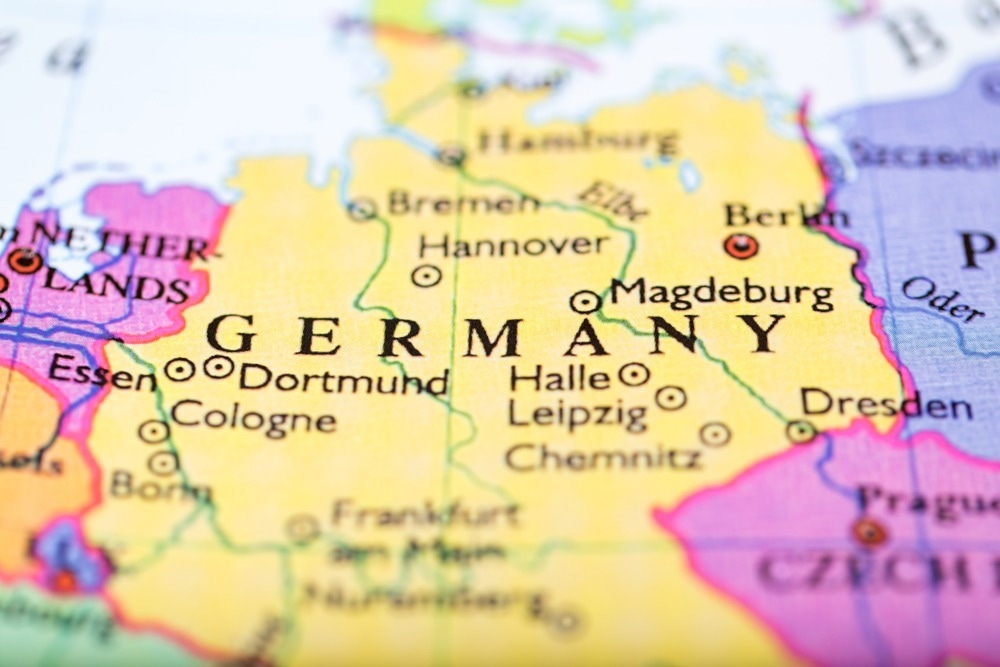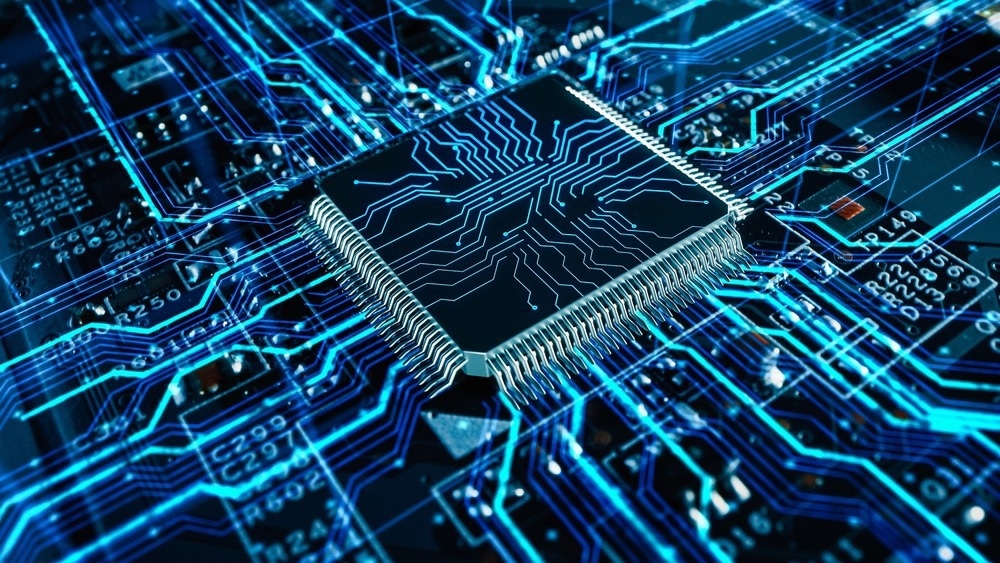Taking advantage of the counter-intuitive phenomena of quantum physics that arise from the dual wave/particle nature of matter at the smallest scales, such as superposition, entanglement, and interference, these sensors can measure the tiniest changes beyond the scope of alternative technology.
Unlike quantum computers, an emerging form of computation that also takes advantage of quantum phenomena, quantum sensors are not waiting in the wings for developments that will allow their realization.
Quantum sensors are already here.
Spearheading the revolution in sensing technology are companies, institutions, and universities hailing from Germany.
“Quantum sensor technology is the quantum technology with the highest potential for industrial applications,” writes Germany-based company Fraunhofer Institute for Applied Solid State Physics IAF (Fraunhofer IAF) on its website.

Image Credit: BIGANDT.COM/Shutterstock.com
Germany: Making Noise in the Quantum Sector
In May 2021, the German Federal Government announced its intention to invest €2 billion into quantum technologies over a time period lasting until 2026.
The education and research ministry has committed €1.1 billion to quantum research and development by 2025, while Germany’s economy ministry has pledged to contribute €878 million to develop applications for quantum technologies.
The plan outstrips the investment committed by almost any other country and is still not the limit of Germany’s investment in quantum tech. In April last year, less than 12 months after the initial promise of €2 billion, the German Federal Government and the European Union (EU) announced it would provide an additional boost to quantum research at Deutsches Elektronen-Synchrotron (DESY), Germany’s largest accelerator center.
This will involve funding two quantum projects in which DESY is heavily involved. The first of these is the Noise in Quantum algorithms (NiQ) project which investigates the reduction of noise in quantum systems that can inversely affect their operation.
NiQ is conducted by researchers from Germany’s Saarland University and the Universität Berlin, as well as Forschungszentrum Jülich and the international companies Qruise and IBM. The funding of almost €2 million is scheduled to last for three years.
The second DESY initiative to receive funding under the plan is the Tensor Networks in the Simulation of Quantum materials (T-NiSQ) project which develops diagnostic tools to assess the dynamics of quantum matter to improve the components used in quantum technology.
Of course, quantum sensor research in Germany extends far beyond DESY.
Diamonds are Forever
The Fraunhofer IAF is at the core of Germany’s quantum sensor push. The institute pursues the visualization of individual bits in electronic storage media and the investigation of brain magnetic fields to control machines with thoughts using a foundation of quantum sensor technology.
Fraunhofer IAF develops diamond-based quantum sensors capable of detecting magnetic and electric fields with a nanometer-scale resolution down to individual electrons and their nuclear spins — the quantum equivalent of angular momentum.
The company states that combining quantum sensor technology with diamond could significantly contribute to rapidly moving quantum tech from the laboratory stage testing stage to real-world applications.
The work of Fraunhofer IAF in the quantum tech field is so vast it is difficult to comprehensively list it all, but one of its most significant developments came in June 2022.
Midway through 2022, Fraunhofer IAF announced a milestone in quantum sensor technology, measuring magnetic-field-dependent stimulated emission using a diamond with a high density of nitrogen-vacancy centers in a laser system.
The development could be adapted to highly sensitive magnetic field sensors with clinical adaptions for measuring the weak magnetic fields of heart and brain activity (MCG, MEG) of the human body and for magnetic resonance imaging (MRI). Thus, demonstrating the utility of quantum sensors in a wide range of fields.

Image Credit: Gorodenkoff/Shutterstock.com
The First Industrial Quantum Sensors
Q.ANT is a wholly owned subsidiary of German high-tech company TRUMPF based in Ditzingen near Stuttgart. In May 2022, the company demonstrated the world’s first industrial-grade quantum sensors.
This showcase included the demonstration of particle sensors capable of measuring particles in gases, liquids, and powders to a sensitivity far beyond the capability of current measuring technology.
Q.ANT says at the heart of this technology are the quantum effects of excited light generated in targeted ways that allow it to be harnessed to assess the size, shape, and velocity of microparticles in a single measurement.
Showing how these sensors could be used practically in industry, the Q.ANT performed the demonstration by measuring coffee powder for a food company. The sensor could allow manufacturers to measure the size and shape of coffee grains, thus monitoring grains during the industrial grinding process, which can ensure the quality and taste of their final product.
Also showcased were Q.ANT sensors that are being used by Festo, a privately owned German control and automation specialist based in Esslingen am Neckar, to collect precise real-time information about the growth of organisms inside its algae reactor.
Not all German quantum sensor applications are so down to Earth, however.
Quantum Sensors in Space
Away from Earth’s surface, quantum sensors can have important applications in the next era of space exploration, as demonstrated by the collaboration between Q.ANT, Bosch, TRUMPF, and the German Aerospace Center (DLR). In August 2022, these German organizations announced their intention to use quantum technology to enhance satellite measurement stability.
Quantum sensors’ important role in satellite communication is due to their ability to facilitate high-precision attitude control that allows operators to prevent satellites from moving out of position, something that can cause the weakening of signals.
The partnership intends to develop space-qualified attitude sensors that could boost signal fidelity and improve satellite internet, especially for remote regions of the globe. DLR plans to launch quantum sensor-equipped miniaturized satellites for high-fidelity internet from space over the next five years.
These sensors could act as a “proof of concept” demonstration for quantum sensors that could also be used in autonomous driving systems and indoor navigation technology deployed in factories, warehouses, and a wide range of other facilities.
Quantum technology is in its infancy, but when it emerges as a fully realized field Germany’s investment during its formative years will ensure its position as a quantum world leader.
References and Further Reading
Quantum Sensors at Fraunhofer IAF. Available at: https://www.iaf.fraunhofer.de/en/researchers/quantum-systems/quantum-sensors.html
Germany to invest €2B in quantum technologies. (2021) Science Business. Available at:https://sciencebusiness.net/news/germany-invest-eu2b-quantum-technologies
German government approves funds for quantum research at DESY. (2022) Science Business. Available at: https://sciencebusiness.net/network-updates/german-government-approves-funds-quantum-research-desy
World’s first industrial quantum sensors: Q.ANT gears up for live demonstration of quantum sensors. (2022) Q.ANT. Available at: https://qant.de/en/hmi-live-demo-quantum-sensor/
Quantum Sensors for Satellite Control Enable High-Speed Connectivity. (2022) Photonics Media. Available at: https://www.photonics.com/Articles/Quantum_Sensors_for_Satellite_Control_Enable/a68320
Disclaimer: The views expressed here are those of the author expressed in their private capacity and do not necessarily represent the views of AZoM.com Limited T/A AZoNetwork the owner and operator of this website. This disclaimer forms part of the Terms and conditions of use of this website.